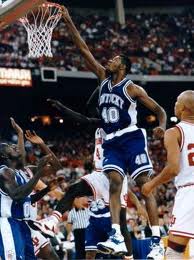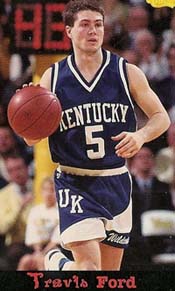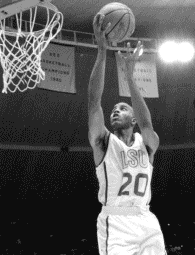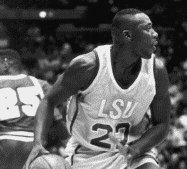CONTENTS
"Most Bizarre Set of Circumstances I Ever Saw" – I
"Most Bizarre Set of Circumstances I Ever Saw" – II
Profile: Joe Dean – I
Profile: Joe Dean – II
The Cow Palace
Still Playing At 41
Pioneer
"It's the socks, Pete!"
Largest Deficit Overcome
Maravich Is for Real
Tiger Den Archives – I
Tiger Den Archives – II
Tiger Den Archives – IV
Tiger Den Archives – V
Tiger Den Archives – VI
Basketball Magazine
Golden Rankings Home
|
Tiger Den Basketball Archives – III
"Most Bizarre Set of Circumstances I Ever Saw" – I
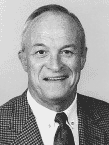
Dale Brown
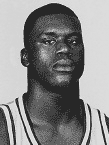
Shaquille O'Neal
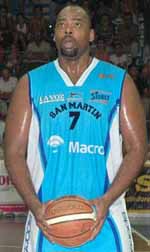
Carlus Groves
|
Those are the words Dale Brown used in his book Tiger in a Lion's Den to describe the SEC tournament game in 1992 in which an intentional foul on junior C Shaquille O'Neal helped the Big Guy decide to go pro.
LSU led Tennessee by 22 in the quarterfinals. Brown's club had been "playing extremely well, winning 11 of our last 12 games." Shaq was dominating the Vols' smaller C, Carlus Groves. "Suddenly, a game we had under control got out of control."
The rules allow a coach to take the floor to stop a potential fight, but the players on the bench must stay put.
- As Dale left the bench, he noticed that Shaq was being restrained by several teammates.
- So the coach made a beeline toward Groves to give him "a piece of my mind." Brown said, "That's the third time you've played this way against us." He then saw Groves pull back to hit him. So Dale raised his right arm to defend himself.
- That's when the scene exploded. In Dale's words, "it looked almost like an old Western barroom brawl." There was the usual pushing and pulling and jawing, but no real punches were landed.
After restoring order, the officials gathered around a tv set to review what happened.
- They ejected Shaquille and four other LSU players, four starters altogether.
- Groves was ousted along with two other starters and three reserves.
After a 15-minute interruption, the game resumed.
- Tennessee rallied to within 10 points with three minutes to play.
- The Tigers made FTs down the stretch to win 99-89 to gain a spot opposite Kentucky in the semifinals the next day.
Reference: Tiger in a Lion's Den: Adventures in LSU Basketball, Dale Brown with Don Yaeger
|
"Most Bizarre Set of Circumstances I Ever Saw" – II
After the LSU Tigers left the court following their 99-89 quarterfinal win over Tennessee in the 1992 SEC Tournament, Coach Dale Brown learned of the fallout from the altercation that occurred when Carlus Groves intentionally fouled Shaquille O'Neal.
- O'Neal would not be allowed to play against Kentucky in the semifinals due to SEC rules regarding players who are ejected from a game for fighting.
- The players who left the bench during the fracas would also be barred.
Already incensed that Shaq had been thrown out of the game when he was the victim, not the instigator, Brown felt this was a second injustice.
- Dale's immediate reaction was to refuse to play the semifinal unless the injustice was corrected.
- SEC Commissioner Roy Kramer was in Kansas City as a member of the NCAA Basketball Committee. But Dale talked to him by phone.
Roy, this is absolutely wrong. This young man has been beaten up all year long. I have told you people in the league that this will eventually cost you one of the great superstars to ever play in our league. He's not going to tolerate this and neither is his family. He will not stay. You have to be fair with the guy, and it's just not fair that he was thrown out of the game against Tennessee and then is thrown out for tomorrow's game too. The perpetrator didn't have a thing to lose. Since Tennessee lost, Groves will not be suspended for a game because their season is over. And now they are asking us to play without Shaquille, who was the victim. The system is all screwed up. The rule is wrong. We're just not playing tomorrow, and that's it.
- As you can imagine, the tournament officials were shocked. What would they tell the TV network? Would they have to refund part of the semifinals ticket money?
- As Dale left for the post-game press conference, his daughter Robyn told him not to say anything about not playing and to think about it before making a final decision. He decided to follow her advice.
- The press corps was hostile. No one asked about Groves but only about Shaq's "retaliation."
- Prone to speak before thinking, Dale couldn't hold it in any longer and launched into the same tirade he unleased on Kramer. He concluded by saying that he would recommend to O'Neal's family that the Tennessee game be his last in the SEC.
At the hotel, both Chancellor Bud Davis and AD Joe Dean told Dale he was making a mistake and asked him to rethink his decision.
The next day, the crowd launched into Brown, who had been made the villain of the affair by the press.
- With Shaq not even allowed to sit on the bench ("absolutely ludicrous," says Dale), the Tigers reflected the pugnacious underdog mentality of their coach against the Wildcats.
- After his club eked out a 80-74 victory, Rick Pitino complimented LSU's inspired play.
As a result of losing in the semifinals, LSU received a lower seed in the NCAA tournament.
- In a move that many regarded as catering to the wishes of CBS, the Tigers were put in a bracket where, after defeating Brigham Young 94-83, they faced Bobby Knight's Indiana Hoosiers in a Saturday night prime time game.
- The 89-79 defeat was O'Neal's last contest in an LSU uniform.
Reference: Tiger in a Lion's Den: Adventures in LSU Basketball, Dale Brown with Don Yaeger
Top of Page
|
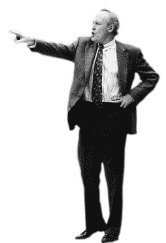
Dale Brown
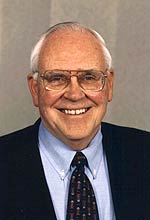
SEC Commissioner Roy Kramer,
no friend of LSU
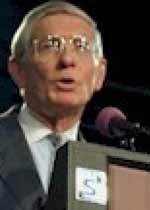
Joe Dean
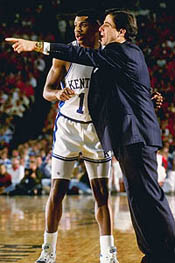
Rick Pitino |
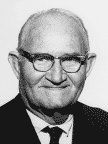
Harry Rabenhorst

Joe Dean

Bob Meador
|
In the 1940s, Tigers Coach Harry Rabenhorst had some recruiting contacts in that basketball hotbed, Indiana.
- One of those sources, former Tiger Ernie Frederick (C 1939-40), recommended a senior from New Albany High School, "Jo Jo" Dean.
- Dean was considered one of the top guards in the state during his senior year of 1948.
- With no limit at that time on the number of visits a prospect could take, Joe visited Kentucky, Purdue, Wake Forest, Louisville, and Alabama, among others.
Several factors led Dean to choose LSU.
- Prior to Dean, two other New Albany grads, Bob Meador and Gene Murphy, had come to Baton Rouge. So had players from other parts of Indiana.
- Dean's high school coach, Gordon Rainey, had acquired a fondness for Louisiana after a visit there and recommended LSU to Jo-Jo. He said that Dean could play early at LSU whereas at Purdue he wouldn't play until junior year.
When he arrived in Baton Rouge, Dean found that his skills put him ahead of most of the Tigers' veteran players.
- Joe led the freshman team to an undefeated season with his "quickness, aggressive D, and all-around hustle."
- With an outstanding jump shot at a time when that form of scoring was still relatively new, Dean became "Jo-Jo" the "Go-Go" Guard.
- Another player on the Baby Tigers was Orval Stone, who came with Dean from New Albany.
- Despite his success on the court, Dean had a difficult adjustment in the Bayou State. In addition to being home sick, he disliked the heat and was disturbed by the lack of interest in basketball. He had played before larger crowds in high school than attended the varsity games at the Parker Agriculture Coliseum.
A major factor in keeping Dean at LSU was his respect for Rabenhorst, whom he called "a good man, a solid individual and human being. ... He didn't know as much about basketball as he did football. But he was such a fine man and a great leader."
- Joining the varsity as a sophomore, Dean combined with Meador as well as Stone to form Rabenhorst's New Albany Trio.
- Having served in the military, Meador was several years older than Dean. An all-around athlete, Bob had excelled as a HB and DB in high school. And baseball was probably his best sport. (He later played in the minor leagues.) He ran sprints and threw the shot put on the Tiger track team.
- Joe ran the team while Meador, an outstanding leaper, played inside. They perfected the inside-out attack.
The Tigers finished the regular season 11-11 in Dean's sophomore season (1949-50).
- Winning on the road in the SEC was particularly difficult in those days. Dean: "Ole Miss played on the second floor of a building Georgia played in Woodruff Hall, which leaked and was just an absolute tragedy. Auburn played in that little hut. Georgia Tech had a gym. At least it was a gym. It wasn't as nice as my high school gym ... The game just had not expanded in this part of the country."
- Illustrative of this point is the fact that LSU defeated Mississippi in Baton Rouge 74-61 in December, then lost to the Rebels 75-65 in Oxford. The Tigers upended Georgia Tech at home 63-52 before losing in Atlanta 85-58. They also traded home victories against Mississippi State and Auburn.
- With scheduling a much looser process than it is today, the Tigers didn't play Kentucky, Vanderbilt, or Georgia during the regular season.
The culmination of the season then, as now, was the SEC Tournament, which was held in Knoxville in 1950.
- The Tigers opened with a 66-57 victory over Florida.
- In the quarterfinals, LSU played its best game of the season, blasting Auburn 73-45.
- Rabenhorst's squad met Tennessee in the semifinals. The Tigers trailed by seven points with a minute to play before capitalizing on several turnovers and hitting some clutch shots to send the game into OT. The Vols won, 81-79, on a basket at the buzzer.
Leading LSU with a 10.8 average, Dean was selected first-team All-SEC.
References: Fighting Tigers Basketball, Bruce Hunter and Joe Planas
Top of Page
|
In Joe Dean's junior year at LSU (1950-1), the Tigers struggled.
- Harry Rabenhorst's team finished the regular season 9-13.
- The highlight of the year was a Christmas-holidays road trip to play Southern Cal and UCLA. The Tigers led the Trojans before losing 78-76 at the buzzer. Then the Bruins, under third-year head coach John Wooden, trounced the visitors, 95-66.
- Dean again led the team in scoring with a 15.1 average.
- The Tigers met Ole Miss in the first round of the SEC Tournament, held in Knoxville again. LSU defeated the Rebs 62-57.>
- Vanderbilt ended the Tigers' season in the quarterfinals, 75-63.
Dean got a present for his senior year in the form of sophomore F Bob Pettit.
- The Tigers began the season with four straight wins, including a 68-61 win over Alabama on December 8. After losing at Mississippi State 59-54, they moved to Oxford the next day and downed the Rebels 81-69 as Pettit exploded for 40 points, a rare total in those days.
- They won two straight home games over Texas 59-55 and Loyola (NO) 77-60.
- SEC teams of that era measured themselves against only one competitor – Kentucky. The Tigers invaded Lexington on January 5 and led in the second half before falling 57-47. Cliff Hagan and Frank Ramsey led Adolph Rupp's Wildcats. Two nights later, LSU completed the northeastern road trip with a 58-47 loss at Vandy.
- Back home, Dean and Company routed two Bulldog teams, MSU 103-78 and Georgia 98-60. After three straight losses (@ Tulane 71-67, @ Ole Miss 68-65, and @ Tennessee (82-68), the Tigers ended the regular season with five straight triumphs. In the last regular season game against Florida at the Cow Palace, Dean became the first player in school history to reach 1,000 points for his career.
- The SEC tournament was back in Louisville that year. LSU clobbered State again 77-44, then upended Ole Miss 75-60. In the semifinals, they bested Florida 77-69 to run their record to 17-6. Pettit led with 25 while Dean contributed 22.
- In the finals at 9 pm that evening before 8,500 mostly blue-clad fans, the Tigers got a rematch with the mighty Wildcats. Pettit and Cliff Hagan, who would enjoy outstanding years together on the St. Louis Hawks, engaged in a spirited duel. Hagan, who had tallied 42 that afternoon against Tennessee, wound up with 19. Pettit outscored him by six, including four baskets in the final period. The fourth put the Tigers ahead for the only time in the game, 43-41, at the 3:30 mark. After a Kentucky FT, LSU got the ball back with a chance to freeze the ball in that era before the shot clock. But an ill-advised shot by Byron Johnson allowed UK to regain possession. Lou Tsioropouolus made a driving layup with less than two minutes to play for a 44-43 lead. A Tiger turnover gave UK the chance to freeze the ball for the final 1:42 to preserve the victory. A lone point separated the Tigers from their first NCAA Tournament appearance. They would achieve that distinction in Pettit's junior and senior seasons.
After graduation, Joe served in the Army during the Korean War.
- Returning to LSU in 1954 to work on a graduate degree, Dean coached the freshman team.
- He played for the Phillips 66ers of the National Industrial Basketball League. Joe was selected as an alternate for the 1956 U.S. Olympic team.
- In 1959, Dean hung up his sneakers to work for a sneakers company, Converse. Eventually, he became vice-president of national promotions.
- He became famous throughout the South as a basketball analyst for NBC, TBS, and Jefferson-Pilot, establishing "String Music" as his signature phrase.
As Bear Bryant would say, "Mama called" in 1987, and Joe became LSU AD, a post he held through 2000.
References: Fighting Tigers Basketball, Bruce Hunter and Joe Planas
Top of Page
|
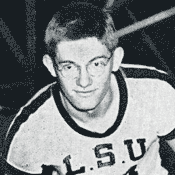
Joe Dean
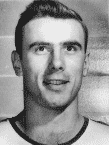
Bob Pettit
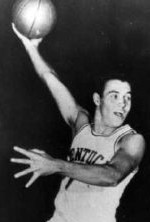
Cliff Hagan
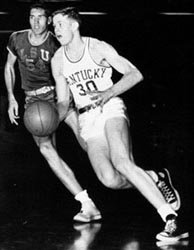
Frank Ramsey
|
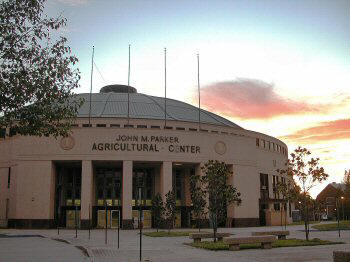
Parker Agricultural Coliseum>
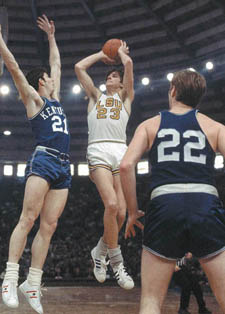
Pete Maravich in action at Parker

Ralph Jukkola
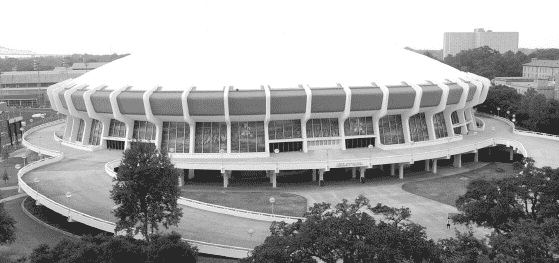
Maravich Assembly Center
|
When the John M. Parker Agricultural Coliseum opened in 1937, it was 6' larger than Madison Square Garden, which made it the largest arena in the United States. Originally seating 12,000, it was the home of the LSU basketball team from 1937 through 1971 when the Assembly Center opened.
- The "Cow Palace," as it was unaffectionately called, was the site of every LSU home game during Pete Maravich's four years on campus. The story has been told many times that, during Pete's freshman year (1966-7), crowds packed Parker for the freshman team's game, then departed in droves before the varsity took the court.
- Ralph Jukkola, who played with Pete two years (1967-9), often showed off a beautiful 8x10 glossy photograph of the interior of Parker Coliseum. The picture was shot expertly to make the place look like Madison Square Garden. Juk admitted that he came to LSU on the basis of that photograph. The Dayton (OH) F had visited the campus before he enrolled but hadn't seen the inside of Parker because an event (probably a rodeo) was going on at the time.
- Press Maravich also said that he never saw the inside of the Coliseum until after he came to LSU as coach for the 1966-7 season.
- As its name implies, Parker was built primarily for events like rodeos and 4-H competitions. As a result, the basketball team had to practice elsewhere until the floor was installed over the dirt/manure ground around Thanksgiving. At the other end of the season, LSU always finished on the road because the floor was disassembled for the Livestock Show at the beginning of March.
- A check of LSU's yearly results shows that, starting in 1952-3 (Bob Pettit's junior year) when the SEC extended the regular season into March, until the Assembly Center became the home court in 1971, LSU never played a March home game.
- In 1968-9, Pete's junior year, the Tigers played their last five games on the road. After losing at Kentucky, Tennessee, and Ole Miss, Press's bunch defeated Mississippi State and Georgia, the latter in two OT.
- A year later, LSU ended the regular season with four road games, losing to Tennessee before upending Ole Miss, Mississippi State, and Georgia to finish 20-8 (13-5 in the SEC) and earn an NIT bid.
- The 1970-1 schedule ended with six road games: losses at Kentucky,Tennessee, Ole Miss, and Mississippi State before closing with wins at Vanderbilt and Georgia.
- The first year of the Assembly Center, 1971-2, saw the season end with only two road games – the annual Oxford-Starkville trip.
- Finally, in 1972-3, Dale Brown's first squad hosted the Mississippi schools in the final games (March 1 and 3).
- Here's a question I don't have an answer for. Was any LSU game at the Ag Coliseum televised? I don't remember any. Of course, no SEC basketball games were telecast until the mid-1960s and then only one each Saturday. I recall several Tiger road games on TV during Pete's era.
- I'll end with a personal story. In the 1990s, my friend Mike visited New Orleans. A lifelong basketball fan from New York City, he revered Pistol Pete. So I took him on a tour of the LSU campus. After showing him Tiger Stadium and the Maravich Assembly Center, I took him to the place where Pete played all his games on campus. As we walked up to The Cow Palace, we caught a whiff of the manure. Inside, he saw the dirt floor and the rickety stands. He was astounded but later said that visiting Parker was the highlight of his trip south. As a P.S., the only time I've attended an event at Madison Square Garden was June, 2001, a WNBA game with Mike.
Top of Page
|
Chris Jackson had one of the most dazzling SEC debuts of any basketball player in history. He poured in 53 at Florida to lead the Tigers to a 111-101 triumph.
- Chris played two years at LSU, making the All-American team both seasons.
- His 30.2 average in 1988-9 is still the highest ever by a freshman.
Jackson was taken at #3 by the Denver Nuggets in the 1990 NBA Draft. A year later he converted to Islam and changed his name to Mahmoud Abdul-Rauf.
- In 1993-4, he came close to setting an NBA record for FT% when he shot 95.6.
- 1995-6, he was having his best season ever, averaging 19.2 ppg and 6.8 apg. His career took an unexpected turn when he stopped standing for the national anthem before games. His reading of the Koran led him to the conclusion that doing so would conflict with his Muslim beliefs.
- A storm of protest by fans caused the NBA to suspend him for one game. However, a compromise was reached whereby he would stand for the anthem but close his eyes and pray. But the boos and taunts continued.
- Traded to Sacramento in the off season, Abdul-Rauf played two seasons there before becoming a vagabond.
- He played in Turkey in 1998-9 before returning to the NBA for one final season with Vancouver in 2000-01.
- In the last decade, he has played in Russia, Italy, Greece, and Saudi Arabia.
- During the 2009-10 season, he is playing with the Kyoto Hannaryz in the relatively new pro league in Japan. This opportunity arose because the coach, David Benoit, who played against Mahmoud at Alabama and in the NBA, called him to invite him to play on the team.
- Mahmoud averaged 16 ppg and served as a mentor to the young players. "I just try to learn as much as possible from him," said Kyoto's Sunao Murakawi. "I watch him closely every game and feel so lucy to be on the same team. He's the best player in the league, and that's impressive given he is 41."
- Abdul-Rauf, who lives in Atlanta in the off-season, wants to play "as long as God gives me the ability and the strength. Right now, I have my health and am still competitive. So, as long as I have the combination of those two things I will still play and afterward, I'll look to coach."
- He has no regrets about converting to Islam. "It was the best decision I ever made in my whole life. It's a great gift."
"Shooting the Lights Out – Remembering Chris Jackson"
Reference: "Still on the Run," Jim Armstrong, Associated Press, 4/5/2010
|
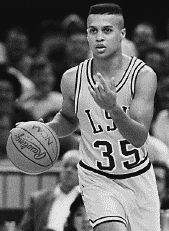
Chris Jackson, LSU

Mahmoud Abdul-Rauf, Kyoto
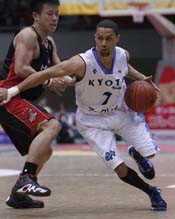
Abdul-Rauf in action
Top of Page
|
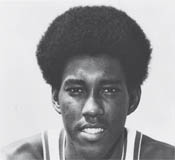
Collis Temple, Jr.
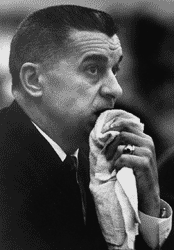
Press Maravich

Dale Brown
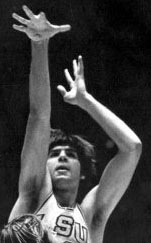
Bill Newton
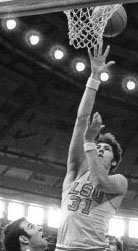
Apple Sanders
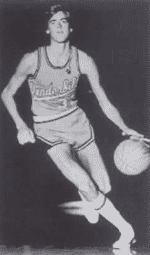
Jan van Breda Kolff
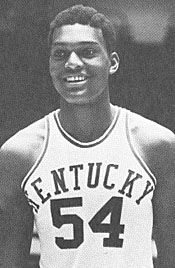
Tom Payne
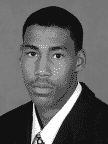
Garrett Temple
|
It was a big day in the Temple family.
- None other than Louisiana Governor John McKeithen visited them in 1970 to recruit 6'8" Collis Temple Jr. for the LSU basketball team.
- McKeithen probably didn't know it, but LSU offering an athletic scholarship to Collis Jr. was vindication for Collis Sr.
- The elder Temple tried to enroll at LSU in the mid-1950s to obtain a master's degree in supervision and education administration.
- However, his application was denied for one simple reason: Louisiana State University didn't admit African-Americans.
- The only black undergraduate entered in 1953 as a result of a court order, but A.P. Tureaud Jr. endured the rejection and harassment for just one semester.
- LSU di d, however, pay C. B. Temple's tuition to obtain a Master's Degree at Michigan State University.
Just as Branch Rickey hand-picked Jackie Robinson to integrate major league baseball because of his strength of character, Coach Press Maravich identified the right young man to break down the color barrier on the LSU basketball team.
- First and foremost, Collis Temple Jr. was an outstanding all-around athlete. He started for the varsity football team as an eighth grader and dreamed of playing QB at Southern, where his dad has played football. He lettered in basketball, football, and track in high school
- An outstanding student as you'd expect from the child of two educators, Collis Jr. spent a summer at the University of Kansas participating in their science camp and playing one-on-one basketball with the Jayhawks' All-American G Jo Jo White. Impressed, the KU coach invited Collis to his basketball camp the next two summers. As a result, he attracted the attention of a number of colleges, including LSU.
- Unlike other black recruits that Press Maravich and his staff approached, Collis didn't shrink from the challenge of integrating the LSU program because he did his father's bidding. I thought that whatever my dad told me was the right thing. And so, if he said this is what I should do, then I felt that's just how it was.
- Dale Brown, who inherited Collis Jr. when he became LSU coach for the 1972-3 season, praised the Temples. They were unbelievably gallant to do what they did. If you're talking about integrating against racists sitting in the background, you couldn't have picked a finer, stronger family than them.
- One Baton Rouge sportswriter said it was about time LSU recruited a black player. In signing Temple, the LSU athletic department finally admitted what they and everybody else connected with sports have known for a long time now; that you don't win consistently in big time college basketball any more without the good black athlete.
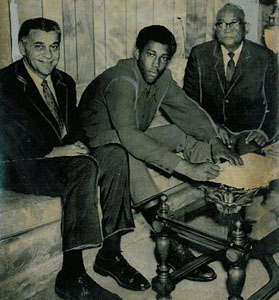
Collis Temple Jr. signs a grant-in-aid with LSU as Press Maravich
and Collis Sr. watch the historic moment. Collis began his LSU career with a successful season on the freshman team the first year following Pete Maravich's departure.
- Temple led the Baby Bengals in rebounds with 16.6 per game.
- He also averaged 17.5 ppg, showed an ability to play defense, and constantly blocked shots.
Off the court, he faced more difficulties than the average freshman.
- LSU had only one other black athlete, a freshman sprinter on the track team.
- Temple says Coach Maravich tried to make sure he was accepted by the basketball staff and his teammates. That included reprimanding the team trainer for denying Collis use of the whirlpool for his injured ankle because he was wearing a robe his girlfriend had given him.
- However, he twice had confrontations with teammates. One called him the N word to his face, precipitating a fight. Another, from Indiana, slipped a long note under his dorm room door that told me to stay out of his way and what he was going to do, and that they lynch people where he's from. The note wasn't signed, but Collis knew who wrote it.
- Older teammates took him to several hangouts near campus his freshmen year, but the group was invariably tossed out because blacks were not welcome. Not much for partying and drinking anyway, Collis quit going.
- He says LSU boosters offered him a car and other benefits - the same inducements they provided his teammates. But he declined. I couldn't take anything - no money, no nothing. I was raised to get what you earn and earn what you get. ... It's a pride thing.
As a sophomore, Collis combined with two seniors, 6'8" Apple Sanders and 6'9" Bill Newton, to form the largest front line LSU had yet deployed.
- But that wasn't enough to survive in the SEC especially with Sanders recovering from a broken ankle as the season started and never getting into ideal shape. Collis was one of only three squad members to play in every game.
- Collis says the coaches wanted him to concentrate on rebounding and defense. Coach Maravich told me I couldn't shoot, kept telling me I had to rebuild my confidence.
- The Tigers went 6-12 in the conference and 10-16 overall. That was enough to cost "Poppa Press" his job.
- Collis has this recollection of his first coach at LSU: I liked coach Maravich all right. He was a nice enough guy. He made an attempt to be pleasant to me, and he had a genuine interest in my welfare as a person. I appreciated that. ... He was an all right coach. The game had probably gotten past him at that time, but he was a pretty good coach.
Another Northerner, Dale Brown, took over the program when everyone else LSU sought declined.
- Collis tried too hard to impress the new coaching staff. Brown relates an incident from Collis's junior season that illustrates the relationship he had with his father.
Temple played hard. He was effervescent, but he wanted to do so much to help that he sometimes played out of control. I kept after him time and time again to keep calm and play under control. Finally, I said, "Collis, just stick with the offense. You are trying to do too much." ... Eventually, after telling him a third time to settle down, I said, "You do it our way or go to the bench."
A few days later, his father, Collis Sr., called me and asked if he could visit. ... Collis and his dad (who was a high school principal) ... came in to my office. Collis Sr. ... wanted to know ... why his son had been benched. I said his son had been pouting, giving up and not fighting for his position.
Senior shocked the daylights out of me. He hauled off and smacked Collis across the chest – wham! And he made him apologize to me and told him, "Collis, this is your father when you're in Baton Rouge. You do exactly what Coach Brown says."
Playing games on the road was often a challenge. The worst incident occurred at Vanderbilt in Temple's senior season (1973-4).
- The first LSU-Vandy clash that year resulted in the Tigers upsetting the #6 Commodores, 84-81 in Baton Rouge. Temple guarded Jan van Breda Kolff. Late in the game, a fight broke out, during which Temple injured van Breda Kolff with a punch.
- The subsequent trip to Nashville would have been difficult for Collis even if he hadn't been black. At halftime, police informed Coach Brown that a phone call from inside the building had warned that, if Brown and Temple returned to the court for the second half, they would be shot. Dale relayed the information to Collis. "I'm going out to play," Temple replied. When the team returned to the hotel after the game, guards stayed outside both men's doors all night.
- Not all the offensive treatment came from white fans and opponents. When LSU played Houston in the Astro-Bluebonnet Tournament, the black players on the Cougars called him an Uncle Tom. They beat the hell out of us, 100-66, and they taunted us and talked about us. It was a bad, bad experience. They were racist.
- Ironically, Collis ranks the northernmost SEC school as the worst place he played while at LSU. I almost felt like I was violating those people when I played at Kentucky. I just really felt unwelcome. And I think it probably had to do with ... their experience with Tom Payne. I could just feel this almost aristocratic, blueblood resentment.
- The Wildcat players were no better. He recalls a game in Baton Rouge. We were elbowing and shoving each other running down the court ... behind the ball. The referees were going down the court, and we were coming behind everything. And it was after I had made a shot. He was running beside me, and he said, "Nigger, you're not going to make no more points today." I just slapped him. People in the stands saw it. The refs looked around, but they didn't see anything other than him stumbling.
Temple made the SEC All-Academic Team his junior year. His senior season he was named to the third team All-SEC squad of United Press International.
Collis was featured in the SEC's 75th Anniversary "Stories of Character" campaign in 2008.
- He founded the Harmony Center, a non-profit organization for foster children and mentally disabled adults.
- He also co-founded the Sports Academy athletic program in Baton Rouge and has served as chairman of BREC, the Recreation & Park Commission for East Baton Rouge Parish.
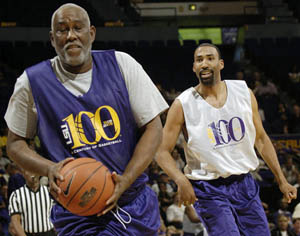
Collis Jr. and Collis Temple III at 100th Anniversary of LSU basketball Younger Tiger fans know Collis Jr. as the father of Tiger cagers Collis III (1998-2003) and Garrett (2004-08). Here's Garrett on his father's accomplishments.
I'm fortunate to have a father that was the first African American to play college basketball at LSU. He's passed on a lot of stories and has given me a lot of advice not only about basketball but also on life. Being the first African American to do that meant he went through a lot of trials and tribulations. Hopefully, his strength has been passed on to me.
Collis Jr. took particular pride in the Tigers' 2006 Final Four team – and not just because Garrett was on it. Three more players, Glen Davis, Tyrus Thomas, and Tasmin Mitchell, played on the AAU summer team that Collis Jr. coached at his Sports Academy in Baton Rouge.
References: Across the Line: Tales of the First Black Players in the ACC and SEC, Barry Jacobs (2008)
Dale Brown's Memoirs from LSU Basketball, Dale Brown
" LSU's First Black Player Revels in Legacy's Growth," Mark Schlabach, The Washington Post, 3/30/2006
Top of Page
|
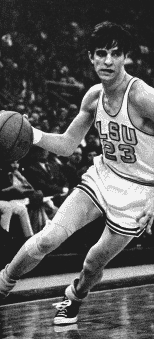 Pete Maravich and his droopy socks |
Pete Maravich was famous for, among other things, his floppy socks. Here's how they became a Pete trademark along with his floppy hair.
- While attending Broughton High School (colors purple and gold) in Raleigh NC where his father Press coached North Carolina State, Pete befriended Bob Sandford, two years his senior.
- Sandford had been a fine athlete at Cary High School and played small college basketball in Virginia.
- After his first year in college, Bob got a job at the YMCA in Raleigh. It was there that he and Pete became fast friends the summer before Pete's senior year in 1964.
- Navigating the confusions of adolescence, Pete saw in Bob a protector and guide. They played ball just about every night and all day on weekends.
One day as they left Bob's apartment for the gym, Pete realized he had forgotten his socks.
- Pete always wore two pairs of socks and liked to push the outer pair down around his ankles.
- Bob told Pete to get some socks out of his drawer. The younger guy chose the oldest, droopiest pair of gray wool socks he could find.
- Maravich hardly missed that day.
- "It's the socks, Pete," Bob told him kiddingly.
- Pete wore the same socks the next day and shot lights out again.
As a result, the floppy socks became a mandatory part of Pete's wardrobe.
- Whether it was superstition, adolescent vanity, or a combination of both, Pete considered the socks his good luck charm.
- The more worn out the socks, the better. Pete would hang out his socks to dry on the line.
- As one friend said, "You didn't mess with Pete and his socks."
Reference: Pistol: The Life of Pete Maravich, Mark Kriegel
Top of Page
|
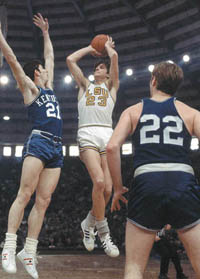
Maravich vs Kentucky |
February 15, 1994, is known in Kentucky as the day of the "Miracle of Mardi Gras" when Kentucky staged the second largest comeback ever in a Division IA basketball game. Unfortunately, it was LSU that blew a 31-point lead in a nationally televised game in the Maravich Assembly Center.
- LSU, 11-9 coming into the fray, led 48-32 at halftime after UK scored only 11 points in the first 11 minutes.
- Then the Tigers used an 18-0 run to gain a 68-37 advantage with 15:30 left to play.
- Then Rick Pitino's Wildcats went on a 24-4 run to slash the lead to 11 with 9:52. Later, Walter McCarty's steal and dunk cut the lead to 82-74 with 6:25 left.
- The Tigers aided the UK cause by missing 11 FT in the last 12 minutes (13-for-24). Forsaking their half-court offense, they also took bad shots, going 6 of 18 from the floor in the final 15:06.
- Kentucky shot almost exclusively 3-pointers in the second half, hitting 12 of 23.
- Finally, McCarty hit a 3-pointer with 19 seconds left to give the Wildcats a 96-95 lead, their first since 1-0.
Dale Brown called his last timeout after McCarty's basket.
- Jamie Brandon missed a layout with five seconds left.
- Tony Delk made one FT, and Travis Ford added two more to seal the 99-95 victory.
- Kentucky scored the last nine points of the game.
The triumph was UK's first in Baton Rouge after four straight losses.
- McCarty led Kentucky (19-5) with 23.
- LSU wasted a 36-point night by freshman Ronnie Henderson - including eight three-pointers - and 32 by Clarence Ceasar, who also led all rebounders with 10.
- However, Clarence undermined his sterling effort by committing four turnovers in the second half while his fellow Brandon contributed four more.
Ford, who had only 10 points but 12 assists, never doubted his team would rally.
- I pulled everyone together and said, "We're down 31 and we're
not leaving this building without
a win. We're going to win this
game no matter what. I'll stay
here all night."
- And everyone just looked at
me, and everyone was so positive.
And everyone said, "You're right" and stepped up their play.
Pitino, however, hadn't been so sure.
- When it went to 30, we just
wanted to make it respectable and
not lose our confidence, said Rick, who ditched his suit coat (which he almost never does). I told them during a tim eout,
"'It's not going well for us,
everything's going well for them. All you can do is show your
character."
- I said, "I don't know if we can
win this thing, but I know we can
give every ounce that we have in
us." And we kept making steals
and steals and steals and then we
started to shoot the basketball
well.
- It was the most unbelievable thing I've ever seen.
Duke still holds the record for the largest comeback when it rallied from a 32-point deficit to defeat Tulane 74-72 on December 30, 1950 in the Dixie Classic at Raleigh NC. (Historical note: Duke's comeback was led by its star G Dick Groat, who later played SS on World Series champions in Pittsburgh and St. Louis.)
|
|

Pete Maravich
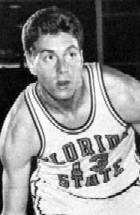
Dave Cowens
|
Associated Press (AP) article December 17, 1967:
Pete Maravich proved he was for real in the Milwaukee Classic but it was in a losing cause for Louisiana State.
Maravich, the nation's leading collegiate basketball scorer, set individual records in the tournament with 42 points for LSU both Friday and Saturday nights but the Tigers lost both games. LSU was beaten 98-96 by tournament champion Wisconsin Friday night and then lost a 130-100 battle to Florida State, which rolled up the highest point total in its history.
Maravich's total of 84 points broke the record of 70 points set by John Austin of Boston College in 1964. He tied his own record of 42 points Friday night by repeating it the next evening.
But it was FSU's night. Jeff Hogan scored 28 points and Dave Cowens added 24.
These were Pete's fourth and fifth varsity games in Baton Rouge since freshmen were ineligible for varsity play at that time. The Tigers had won their first three games to equal the win total of the previous season, Press Maravich's first at LSU.
- 97-81 over Tampa at home December 2
- 87-74 at Texas December 4
- 90-56 over Loyola (NO) December 9
After the trip to Wisconsin, LSU won seven of its next eight games, losing only at Florida. Unfortunately, the Tigers then fell into a five-game losing streak on their way to a 14-12 overall record, 8-10 in the SEC.
Top of Page
|
|









